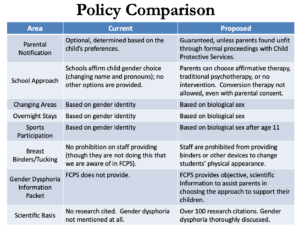Gaps in Policy 443: What the Policy Doesn’t Address
The policy that purports to create a welcoming environment for gender non-conforming and transgender students (443) that was developed over 6 years ago is not just out of date, as we’ve proven, it is significantly incomplete. We support none of the following provisions and have proposed changes, but since the BOE has stated it will not consider any changes, here are just a few examples of gaps in the policy they support that has never been addressed.
Bathroom Choice: The policy allows bathroom choice by chosen gender but does not address how that will work or the concerns of safety or privacy expressed by students and families that are not gender nonconforming or transgender. It makes no provision for the costs associated with the changes needed to allow the provision to work. It merely states that bathroom choice is to be based on gender choice and that the BOE does not want to “stigmatize” the gender non-conforming and transgender students. No mention of the impact on the nearly 45,000 students who don’t choose alternate genders.
Interscholastic Sports Team Participation: The policy allows sports participation by chosen gender but makes no further assessment of the impacts of that provision. What’s more, it makes no financial assessment of the impacts. How will FCPS deal with locker rooms, shared or separate? How will the schools mitigate unfairness or risk of physical harm as has happened now in a number of schools where similar provisions exist? How will FCPS handle visiting teams that have a preponderance of males on a girl’s sports team? Will participation of a student on a team that doesn’t match their biological gender require a medical diagnosis or will FCPS just accept the student’s self-identified gender? Are testosterone reduction treatments a requirement for male students as has been adopted by some organizations? How will the school address the loss of scholarship opportunities by girls as they are overwhelmed by the physical advantages of biological males? Will FCPS maintain two sets of school athletic records, and if so, is that allowed if we decide that biological sex is irrelevant?
Note: All of the BOE members, with the exception of Nancy Allen, refuse to go on record on whether they support this provision or not, but all except Ms. Allen support no changes, inclusing this provision. Please ask them to provide their individual positions as elected officials and why they think this is fair for all students.
Parental Notification: The policy restricts parental notification of a child’s gender choice at school but makes no mention of the psychological conditions associated with gender confusion. It actually doesn’t once mention gender dysphoria, the psychological term for gender confusion. The policy does not acknowledge it is a recognized psychiatric condition.
By precluding parents, the policy ignores the possibility that a child may have a contributing psychological or behavioral situation that only a parent and a family’s healthcare provider would know about. How will they ensure that a full assessment of a child is obtained before they affirm a child’s self-diagnosis of a psychiatric condition? The answer is they won’t, which we’ve repeatedly proven is harming children and dividing families. Ask the board members how they justify keeping parents in the dark.
School-sponsored overnight trips for students: The policy states that accommodations for overnight stays on school-sponsored field trips are not to be separated by biological sex but by self-identified gender. It does not mention how this will be managed. We think some very specific updates are needed to ensure all impacts of how this will be executed in a safe and fair manner. For example, will parents be notified if there is a situation where the students will be housed with members of a different biological sex?
If you agree with the above policies, remain silent, but if you oppose any or all of the above policy provisions, contact the BOE and Superintendent Dyson and tell them to make the changes we propose.


